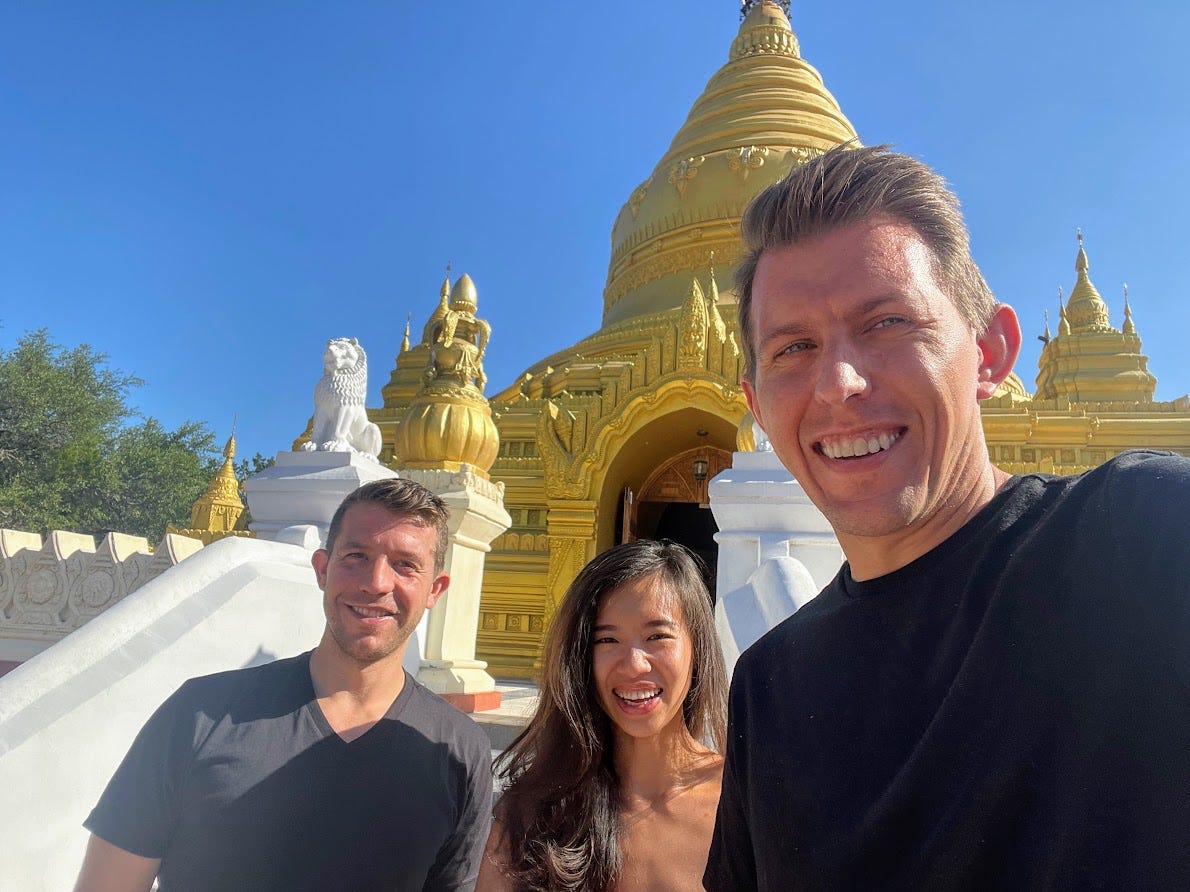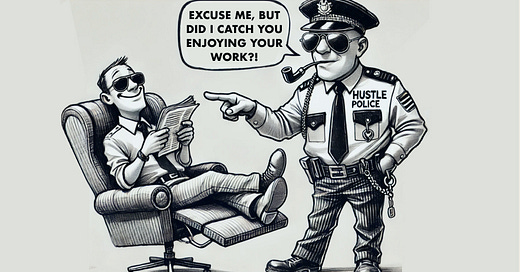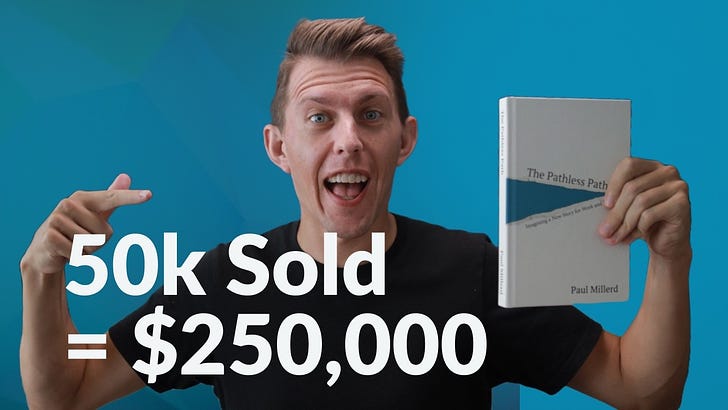Too Big To Think, Defining Enough, Arc of The Creator & How Grifty is Your Job? | #185
June 11th, 2022: Greetings from Austin! It’s hoooooot here. Consistently hitting 100 every day, but I also kind of like it. Consistently sunny and hot every day. Sadly, we are leaving Austin in a couple weeks. We’ll be making our way up the coast of the Pacific Northwest starting next Friday and then will head to Connecticut to be with family in July and August. Our tentative plan is also to go to Portugal for September and then back here to Austin. Let me know if you are going to be around any of these places!

You ditched the traditional path… why haven’t you ditched your traditional health insurance?
Experience the freedom and affordability of cash payments and community-funded healthcare with CrowdHealth.
Use promo code “Boundless” during sign-up for a special discounted subscription offer.
#1 Too Big To Think 🤔🤔🤔
I originally wrote something about a half-baked idea of “too big to think” when reflecting on my experience with the Yak Collective in 2020. At the time I was shocked in a good way at how a group of random internet indies was able to come together to create that felt creative, fact-driven, and weird at the same time.
Here’s what I argued at the time:
This would be great if the consulting firms were thought-leaders, but instead they have become too big to think - trapped by their own scale and success. When BCG introduced the growth share matrix and experience curve in the late 1960s these were additive innovations, but the firm was small and scrappy with less than 100 consultants. Now BCG has more than 21,000 people. McKinsey, more than 30,000.
I finally pulled together those ideas into a more cohesive essay, which I published this week. Here’s how it starts:
Too Big To Think: Why Prestigious Institutions Stopped Generating Good Ideas
In the late 1960s the founder of Boston Consulting Group, Bruce Henderson, divided his company into three color-coded teams: red, blue, and green. These teams were instructed to compete against each other. He hoped that the experiment would generate new ideas for how to run a consulting firm.
It worked. In a few years, Bill Bain and his blue team prototyped a new fee model that enabled them to increase fees and deepen partnerships with clients. Unfortunately, Bain also decided that he should start his own firm. In 1971, he left the company to start Bain & Company and took many of Boston Consulting Group’s top leadership with him.
After spending seven years working in the strategy consulting industry, it’s impossible to imagine this kind of experiment taking place in those same firms. Today’s top three strategy consulting firms, McKinsey, Bain, and Boston Consulting Group, are large organizations that haven’t seen a serious competitor in more than thirty years and are known more for scandals and 100-page PowerPoint “decks” than being the source of innovative and creative new ideas.
During Bill Bain’s time at Boston Consulting Group and then at Bain & Company, however, strategy consulting firms were a central force in creating, shaping, and popularizing many of the most important business ideas of the 20th century.
At some point, these firms became “too big to think” which occurred to me after I decided to leave the industry after nine years to work on my own in 2017. Despite fewer resources and no “brand” to lean on, I’ve been able to unlock a level of creativity and idea generation as an independent researcher and writer of words on the internet that is ]beyond what I felt possible at any point in my previous path.
How is this possible and what does it mean about where ideas might emerge in the future?
#2 Defining Enough
A few years ago I stumbled upon Paul Jarvis’ definition of “enough” in an essay he had written on his blog. He is the author of Company of One and has inspired some of my thinking on doing my own company of one remix.
I wrote about this in my book in more detail but here is his definition:
Here is part of his definition:
Enough is the antithesis of unchecked growth because growth encourages mindless consumption and enough requires constant questioning and awareness. Enough is when we reach the upper bound of what’s required. Enough revenue means our business is profitable and can support however many employees/freelancers we have, even if it’s just one person. Enough income means we can live our lives with a bit of financial ease, and put something away for later. Enough means our families are fed, have roofs over their heads and their futures are considered. Enough stuff means we have what we need to live our lives without excess.
One way I deal with the infinite possibilities of self-employment is to declare principles to myself or take a stand on things.
One thing I realized when I started to work on my own (and somehow was less obvious to me when employed) was that the default pull of the world is more. More money, More Stuff. More status. More everything,
This means if you don’t take a stand on anything, you are accepting this default and your orientation towards the world will be to always say yes when offered more.
One way to deal with this is to write your own definition of enough. Here’s mine:
Enough is knowing that no amount in my bank account will ever satisfy my deepest fears. It’s knowing that I have enough friends that would gladly open their door and share a meal if I was ever in need. It’s the feeling that I’ve been able to spend my time over an extended stretch of time working on projects that are meaningful to me, helping people with a spirit of generosity, and having enough space and time in my life to stay energized to keep doing this over the long‑term. Enough is seeing a clear opportunity that will increase my earnings in the short‑term, but knowing that saying “no” will open me up to things that might be even more valuable in ways that are hard to understand. Enough is knowing that the clothes, fancy meal, or latest gadget will not make me happier, but also that buying such things won’t mean I’m going to end up broke. Enough is having meaningful conversations with people that inspire me, people that I love, or people that support me.
If you decide to write your own, please share!
#4 The Creator Path With Lawrence Yeo
Listen: Apple | Google | Spotify | RSS
Being an undeclared major till his senior year of college, Lawrence didn’t really know what he wanted to do. After looking up which jobs make the most money, he decided to declare as an economics major, leading him to explore Investment Banking. While he didn’t end up working in investment banking, he was still pulled by the power of prestige, something he says “is a drug, and is most potent” when you are young and looking at schools.
Over a number of years and experiments with music and creating and writing, he slowly started to figure out a better path forward for him. After leaving the corporate world for a second time, Lawrence finally found a calling – writing on his blog: More To That where he uses visual storytelling to express his ideas of pursuing alternative paths, sharing ideas, and creating online.
#4 Take More Chances
I really liked this essay from Ryan Herr on “taking more swings”
Seven years ago data science was already a big trend outside State Farm but, and I know this sounds incredible for an insurance company, wasn't a thing yet inside.
It was obvious that eventually they’d bring on data scientists, so I signed up for the first online courses I could find and started to reinvent myself.
When State Farm officially created a data science team, I hustled my way onto it because I was prepared. With my pivot from business generalist to data scientist, I doubled my income, and I'm much happier with my career.
So all the times I struck out didn't matter. I didn't need a good batting average. I just needed enough swings to get one hit. I wish I could have convinced my company this. But I'm glad to have convinced myself.
#5 Jobs vs. Self-Employment
A random thought this week

I am focused on building a life around exploring ideas, connecting and helping people, and writing. If you’d like to support my journey, the best ways are to:
Buy my book, The Pathless Path
Purchase one of my courses on freelancing or reinventing your path
Become a sponsor of Boundless or my podcast (starting at $100)
In addition, I recommend all of the following services (affiliate links).
Kevin Shen’s Dream Studio Cohort-Based Course (or custom studio builds)
Podia - 14-day free trial (read my review here)
Teachable - 14-day free trial
Skystra - Fast WordPress Hosting
Circle - 14-day free trial
Alternatively, if you simply just want to send me a monthly donation and encouragement to “keep going” the best way is to become a paid supporter of the newsletter (which includes free access to the book and Reinvent).
A reminder: I don’t check unsubscribe alerts and never look at my subscriber list. So if you feel like unsubscribing, you can do so below.














